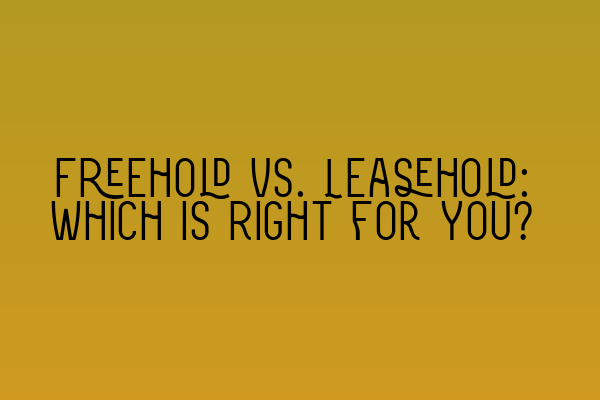Freehold vs. Leasehold: Which is Right for You?
When it comes to property ownership, there are two primary categories to consider: freehold and leasehold. Each has its own set of advantages and disadvantages, and understanding the differences between these two types of ownership is crucial before making a decision. In this blog post, we will explore the key features of freehold and leasehold properties to help you determine which option is right for you.
Freehold Properties: A Sense of Ownership and Control
A freehold property is a type of ownership where you own both the building and the land it stands on outright. This means that you have complete control over your property, allowing you to make decisions about its use, alterations, and even its resale. Freehold ownership often carries a sense of security and independence, making it an attractive option for many homebuyers.
One of the major benefits of freehold ownership is that you do not have to pay ground rent or service charges to a landlord. Instead, you are solely responsible for all maintenance and repairs, giving you the freedom to maintain your property according to your own preferences. Additionally, freehold properties generally appreciate in value over time, offering the potential for long-term financial stability.
However, it is important to note that with great power comes great responsibility. As the owner of a freehold property, you will be solely responsible for the upkeep and maintenance of the property, including all associated costs. This includes any repairs, structural maintenance, and insurance expenses. It is therefore crucial to budget for these additional expenses when considering a freehold property.
Leasehold Properties: Affordability and Convenience
On the other hand, leasehold properties involve owning a property for a fixed period of time as specified in the lease agreement with the freeholder. While you do not own the land outright, you have the right to live in the property for the term of the lease. Leasehold ownership is most commonly associated with apartments and flats, where multiple units are situated in the same building.
One of the main advantages of leasehold ownership is that it often offers more affordable entry-level prices compared to freehold properties. This can make it an attractive option for first-time buyers or those with a limited budget. In addition, the responsibility for property maintenance and repairs is typically shared among all leaseholders, reducing the financial burden on individuals.
Furthermore, leasehold properties often benefit from the convenience of having a management company or freeholder who is responsible for the day-to-day maintenance and overall upkeep of the building and common areas. This can alleviate some of the responsibilities associated with property ownership, making it a popular choice for those seeking a more hands-off approach.
However, leasehold ownership also has its drawbacks. Firstly, leasehold properties usually require the payment of ground rent and service charges to the freeholder, which can increase over time. Additionally, the lease term will eventually expire, meaning you will no longer have the right to live in the property unless the lease is extended or renewed. This can create uncertainty and potentially impact the property’s future value.
Which Option is Right for You?
The decision between freehold and leasehold ownership ultimately comes down to your personal circumstances and preferences. If you value complete control, independence, and long-term investment potential, freehold ownership may be the better option for you. Conversely, if affordability, convenience, and a more hands-off approach are your priorities, leasehold ownership might suit you better.
Before making a decision, it is crucial to carefully review the terms of any leasehold agreement, including the length of the lease, ground rent obligations, and service charge provisions. It is also advisable to seek legal advice from a property solicitor who can provide guidance tailored to your specific situation.
At SQE Property Law & Land Law, we offer expert legal services to help you navigate the complexities of property ownership. Our team of experienced solicitors can advise you on the different types of property ownership, assist with contract negotiations, and provide guidance on lease extensions or enfranchisements.
To further assist you in your journey to becoming a qualified solicitor, we also offer SQE 1 preparation courses and SQE 2 preparation courses. These courses are designed to help you succeed in the Solicitors Qualifying Examination (SQE) and equip you with the skills and knowledge required for a successful legal career. Check out our related articles for more information on our preparation courses and SQE exam dates.
In conclusion, the choice between freehold and leasehold ownership depends on your individual circumstances and priorities. Understanding the advantages and disadvantages of each type of ownership is crucial in making an informed decision. Remember that legal advice and guidance can be invaluable throughout the process, ensuring that your property ownership journey is smooth and successful.
